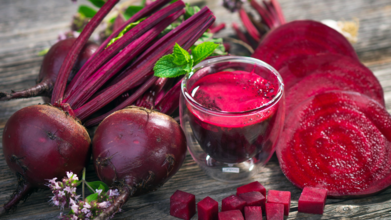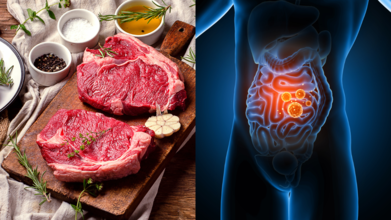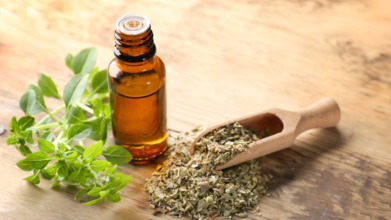- Health Conditions A-Z
- Health & Wellness
- Nutrition
- Fitness
- Health News
- Ayurveda
- Videos
- Medicine A-Z
- Parenting
- Web Stories
Drinking THIS Juice Shot Twice A Day Could Lower Your Blood Pressure, Especially In Older Adults

Credits: Canva
A recent study published in Free Radical Biology and Medicine journal, titled Ageing modifies the oral microbiome, nitric oxide bioavailability and vascular responses to dietary nitrate supplementation, suggests that drinking a small amount of a nutrient-packed vegetable juice twice daily may help lower blood pressure in older adults. The study suggests that no medication on top is required.
This is a promising news for America's aging population. 70% of these adults are over the age of 65 and live with hypertension. High blood pressure is thus one of the biggest risk factors for them, which may lead to heart disease.
What Was The Study About?
Researchers from the University of Exeter in the UK carried out a fascinating trial involving 39 younger adults under 30 and 36 older adults in their 60s and 70s.
Participants were asked to drink a shot of beetroot juice, a vegetable naturally rich in dietary nitrates, twice a day for two weeks. After that, they paused for another two weeks while using antiseptic mouthwash daily, before repeating the process with a placebo juice that had its nitrates removed.
ALSO READ: Man Falls Ill After Seeking ChatGPT Advice on Cutting Salt
At the end of each phase, researchers studied their oral microbiomes, the mix of bacteria living inside the mouth, using gene sequencing. The results revealed a surprising connection between nitrates, oral bacteria, and blood pressure.
What Did The Study Find Out?
For older adults, beetroot juice led to a drop in bacteria linked to infections and an increase in bacteria associated with better health. Most importantly, their blood pressure levels fell noticeably after drinking the nitrate-rich juice, something that did not happen with the placebo or among the younger participants.
“This study shows that nitrate-rich foods alter the oral microbiome in a way that could result in less inflammation, as well as a lowering of blood pressure in older people,” said co-author Dr. Andy Jones.
Why Does Beetroot Work?
What makes beetroot juice so powerful? The answer lies in nitrates. These molecules, made of nitrogen and oxygen, are naturally present in soil, water, and certain vegetables, particularly leafy greens and root vegetables like beets. The body also produces nitrates on its own.
READ: Vitamin B6 In Your Favorite Energy Drink Is Making You Jitter
When consumed, nitrates are converted into nitric oxide, a molecule that helps regulate blood flow, lower blood pressure, and improve oxygen delivery in the body.
Experts note that while a nitrate-rich diet benefits people of all ages, older adults produce less nitric oxide as they age. This decline contributes to higher blood pressure, raising the risk of heart attacks and strokes.
Interestingly, researchers believe the oral microbiome may play a key role in this process. If there’s an imbalance between “good” and “bad” bacteria in the mouth, the body may struggle to efficiently convert nitrates into nitric oxide, weakening its natural blood pressure regulation system.
“By uncovering how dietary nitrate affects oral bacteria and blood pressure in older adults, the study opens up new opportunities for improving vascular health through nutrition,” explained Dr. Lee Beniston of the Biotechnology and Biological Sciences Research Council.
Similar Findings Before
This isn’t the first study linking beetroot juice to better heart health. A 2017 meta-analysis showed that regular beet juice consumption lowered both systolic and diastolic blood pressure across multiple trials.
In 2022, another review analyzed studies where participants drank varying amounts of beet juice daily, ranging from 70 mL to 250 mL, for periods lasting 3 to 60 days. While all doses helped, those who consumed 250 mL per day experienced the most significant drops in blood pressure.
Some earlier research even showed that beet juice could lower blood pressure in just three hours. However, experts say the most sustained benefits come from drinking it consistently over at least two months.
Beef, Pork, and Lamb Might Do More Than Fill You Up; Study Finds They Could Be Flaring Up Your Gut

Credits: Canva
Gaining weight by eating too many lamb chops or beef burgers is not the only risk. A new study published in Molecular Nutrition & Food Research suggests that red meat might be less of a comforting indulgence and more of a gut irritant. According to researchers at Capital Medical University in China, diets overloaded with pork, beef, or mutton could stoke inflammation inside the digestive system, potentially worsening gut-related disorders.
The Experiment
Scientists turned to an animal model. Mice were fed a diet high in red meat before being given a chemical that induces colitis, a condition that resembles inflammatory bowel disease (IBD) in humans. Results showed that the red-meat-fed mice experienced significant weight loss, shorter colons, and visible tissue damage. Their immune systems also went into overdrive, flooding the gut with inflammatory cells. Essentially, the study found that when the gut is already irritated, red meat makes the fire burn hotter.
All Red Meat Counts
Before you point fingers at beef or lamb individually, the researchers clarify that the issue is not with one specific type of red meat. The effect was observed across the board, whether it was pork, beef, or mutton. The common thread was the way red meat in general seemed to intensify inflammatory signals in the gut.
Gut Bugs in Trouble
One of the most striking findings was how red meat tampered with the gut microbiome—the trillions of tiny organisms that work quietly to regulate digestion and immunity. In the study, mice on red meat lost beneficial bacteria, particularly those that protect the gut lining and keep inflammation low. In their place, harmful microbes took over, making the digestive tract more vulnerable.
Why This Matters for Humans
While the experiment was done in mice, the implications for humans are worth paying attention to. People with conditions like Crohn’s disease or ulcerative colitis often report flare-ups after eating red meat. The study offers a possible explanation for this: the combination of heightened inflammation and a disrupted microbiome makes the gut more sensitive. For those already battling IBD, red meat might be less of a protein-packed friend and more of a troublemaker.
The Moderation Mantra
Does this mean you should swear off meat forever? Not necessarily. The researchers were clear that the study does not prove red meat directly causes IBD or that it should be completely eliminated from your plate. Instead, moderation seems to be the golden rule. If you do enjoy red meat, balance it out with plenty of fibre, fruits, vegetables, and lean proteins such as fish or chicken. A varied diet gives your gut a better chance of staying healthy and less inflamed.
Handle with Care
Red meat has long been under scrutiny for its links to heart disease and cancer risk, and now gut health joins the list of concerns. While more human studies are needed, the findings serve as a gentle nudge to reconsider how often you pile your plate with steak or kebabs. Your gut microbiome is like a delicate ecosystem. Treat it kindly, and it will return the favour.
Can Bananas Help You Build Muscle, Improve Digestion, and Gain Weight the Healthy Way?

Credits: Canva
When it comes to healthy eating, bananas often get underestimated. We usually treat it as a quick snack, but rarely do we stop to appreciate just how powerful this fruit can be. Bananas are not just about curbing midday hunger pangs; they can help you gain weight the right way, support muscle recovery, and even improve digestion.
The Banana as a Natural Energy Bar
“Banana is one of the high-protein fruits. It is also called a natural energy bar because of its rich nutrient profile,” says Nutritionist Anushi Jain. She explains that bananas act as both a quick energy source and a way to sustain fullness for longer periods.
That is because bananas are packed with carbohydrates, dietary fibre, and natural sugars like glucose, fructose, and sucrose. Together, these make bananas an effective food for anyone looking to put on weight in a healthy manner. But it is not just calories that make them special. Bananas also deliver a solid dose of potassium, vitamin B6, magnesium, and antioxidants, all of which contribute to overall health while promoting muscle recovery.
Calories That Count
One of the simplest reasons bananas work well for weight gain is their calorie content. A single medium banana provides around 100–120 calories, making them a convenient way to bump up your daily intake. But the real magic happens when you pair bananas with protein and healthy fats.
“When combined with foods like nut butters, milk, or seeds, bananas become a balanced meal that supports both muscle building and gradual, healthy weight gain,” adds Jain. In other words, instead of relying on protein powders or supplements, you can simply slip bananas into your everyday meals for better results.
Bananas and Better Digestion
Bananas do not just help you add calories; they also help you use them well. “Bananas are high in calories and important nutrients like potassium, vitamin B6, and fibre. They also help with digestion, making it easier for the body to absorb nutrients,” explains Dr Shabana Parveen, Head of Dietetics at Artemis Hospitals.
This means that adding bananas to your diet is not just about eating more but also about ensuring your body makes the most of the food you consume. Proper digestion is the backbone of healthy weight gain, and bananas play a quiet but crucial role here.
Easy Ways to Add Bananas Into Meals
Another reason bananas are a favourite among nutritionists is their versatility. They do not demand elaborate recipes or complicated meal prep. “Bananas slip into meals effortlessly,” says Jain.
Here are some easy ways to make the most of them:
- Smoothies: Blend bananas with milk, nut butter, oats, or seeds to create a calorie-dense shake that doubles as breakfast or a post-workout booster.
- Breakfast Bowls: Layer sliced bananas over oatmeal, porridge, or yoghurt for extra creaminess and a burst of energy.
- Nut-butter Pairing: Spread peanut or almond butter on banana slices for the perfect protein-fat-carb combo.
- Desserts: Use mashed bananas in muffins, pancakes, or healthy energy bars as a natural sweetener.
- Post-workout Snack: Pair bananas with whey protein or nuts to replenish glycogen and aid muscle repair.
- Frozen Treats: Blend frozen bananas into a creamy, guilt-free ice cream substitute.
“Bananas are a healthy choice for people who want to gain weight without eating processed foods,” Dr Parveen points out. Whether you mix them into shakes, mash them into bakes, or simply pair them with a handful of nuts, bananas deliver nutrition in the simplest, tastiest form.
Big Benefits
Can bananas help you build muscle, improve digestion, and gain weight the healthy way? The answer is a resounding yes. They are calorie-rich yet wholesome, versatile yet fuss-free, and packed with nutrients that go beyond just filling you up.
Both Jain and Dr Parveen agree that when combined with other nutrient-dense foods and regular exercise, bananas can become a powerful ally in your health journey. Whether your goal is to bulk up, repair muscles, or just keep your gut happy, the next time you reach for a snack, you might want to think banana.
Is Oil Of Oregano Really A 'Magic Cure'?

Credits: Canva
Oil of oregano, also known as oregano oil, is a concentrated extract derived from the leaves of the oregano plant. Typically available in liquid drops or capsule form, it has long been promoted for its potential health benefits, particularly during cold and flu season. Some people dilute it in water or juice, while others add it to their supplement routine.
For centuries, oregano oil has been praised in traditional remedies for its antimicrobial and immune-supporting properties. Modern studies suggest that compounds like carvacrol and thymol found in the oil may help fight certain bacteria, fungi and viruses, at least in laboratory and animal studies.
But experts caution against overestimating its power. As USA Today quotes Mascha Davis, MPH, RDN, a registered dietitian and nutritionist, “While oil of oregano can be part of a short-term wellness strategy, it’s not a magic cure-all.” Much of the evidence so far has not been tested in humans, making it difficult to draw strong conclusions about its effectiveness.
Why Was It Believed To Be A 'Magic Cure'?
Oregano has long been associated with Romans and Greeks and is said to trace back as early as 3000 BC, when it was used by Assyrians. It has been used in folk medicine for over many centuries and is extracted from the leaves of oregano. In the Middle Ages, the plant was considered a magic herb that could ward off witches and even the devil himself. This is why the oil extracted from it earned its name as the 'Magic Cure'.
Also Read: ‘Drink Castor Oil To Cleanse Your Colon,’ Says Sadhguru, But Science Isn’t Convinced
What It Can and Can’t Do
Research shows oregano oil does have antimicrobial and antioxidant properties, but clinical trials on humans remain limited. Benefits linked to digestion or immunity have largely been observed outside the human body, in cell or animal studies.
Who Should Avoid It
Despite its popularity, oil of oregano isn’t safe for everyone. Davis also advises that those who are iron deficient, pregnant, breastfeeding, allergic to mint, or taking certain medications, such as blood thinners or drugs for diabetes, should avoid it unless directed otherwise by a healthcare provider.
Even healthy individuals should use it with caution. Because it’s highly concentrated, taking too much or using it without dilution may irritate the gut lining. Experts recommend using it sparingly and only for short durations, such as a few days to a week, while closely following dosage instructions.
Read: The Truth About Cooking Oils: Which One Should You Really Use?
The Bigger Picture
Relying on oregano oil alone for long-term health isn’t sustainable. Experts emphasize that proven habits, like eating a nutrient-dense, plant-based diet, getting quality sleep, managing stress, and incorporating probiotics, are more effective for maintaining immunity and gut health in the long run.
The takeaway? Oil of oregano may have its place as a short-term supplement, but it’s not the all-in-one remedy it’s often marketed to be.
Read More: Common Cooking Oil Ingredient May Cause Your Breast Cancer
© 2024 Bennett, Coleman & Company Limited

